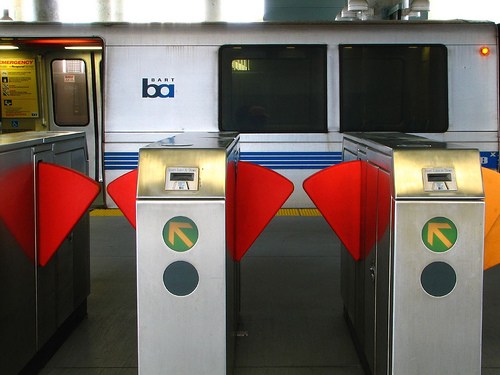BART plays an essential role in hundreds of thousands of people’s daily commutes. As BART riders elected to the agency’s board of directors, we firmly believe that BART should invest in transporting our riders and keeping them safe, not furthering a national anti-immigrant agenda.
That’s why we and BART Directors Rebecca Saltzman and Bevan Dufty support a proposed BART Safe Transit Policy, so that all riders can reach their destinations without fear.
The risks to our undocumented riders are real. On May 14, after being questioned about his immigration status, a rider on the Metro Transit system in Minneapolis was tased and arrested. Within days, he was transferred to the U.S. Immigration and Customs Enforcement, and a federal immigration judge ordered him deported. The right to use public transit should never come with exposure to such danger. Implementing the Safe Transit Policy is essential for preventing similar incidents on BART.
We understand how critical our system is for residents to get where they need to go. With more than 500,000 people living in the Bay Area without legal permission, we must ensure that all riders are protected when using BART in their professional and personal lives. Immigrants, including those who are undocumented, are an indispensable part of our community and economy, and their contributions to our cities are an important reality in the Bay Area.
The Safe Transit Policy ensures that regardless of ethnic or national origin, gender, gender identity, race, religion, sexual orientation or immigration status, riders can count on a safe and secure environment on BART.
Specifically, the policy would forbid BART from spending its resources to enforce federal immigration law and prohibit BART police officers and employees from questioning riders about their immigration status.
This isn’t just about protecting our immigrant communities; it is also about facilitating an environment where riders feel comfortable and protect one another. Maintaining rider safety is a collective effort. BART is safer for everyone when every rider can trust and work with law enforcement. A Safe Transit Policy will ensure that victims and witnesses of crimes do not fear to speak up and report incidents to BART police.
Under Safe Transit, we will not waste BART’s resources on anti-immigration policies that undermine the trust between riders and BART police. Instead, we will center our law enforcement efforts on patrolling trains, stations and parking lots, and preventing crime throughout our system. Our BART police are most effective when they can focus on their primary duties rather than becoming entangled in federal immigration enforcement efforts.
San Francisco, Oakland, Berkeley, Richmond, Hayward and other cities and counties served by BART have voted for their own sanctuary policies, which BART’s Safe Transit would bolster and expand. This policy has broad support from Bay Area elected officials, including Oakland Mayor Libby Schaaf, Berkeley Mayor Jesse Arreguín, state Sens. Scott Wiener, D-San Francisco, and Nancy Skinner, D-Berkeley, Assemblymen David Chiu, D-San Francisco, and Rob Bonta, D-Alameda, San Francisco Supervisor Jane Kim, and former San Francisco Supervisor David Campos.
The Bay Area’s success rests on the contributions of hard-working immigrants and refugees. They enrich our communities as neighbors, students, working professionals, religious leaders, community advocates, parents, artists and business owners. It is imperative that these riders, who shape and sustain our region, can get around safely on BART.
We plan to vote in favor of the Safe Transit Policy at the June 22 BART Board of Directors meeting, and we hope you can join us in support.
Lateefah Simon and Nick Josefowitz are BART directors representing Districts Seven and Eight, respectively. They are joined in this view by BART Directors Rebecca Saltzman (District Three), and Bevan Dufty (District Nine).
The Board of Directors will vote on the Safe Transit policy June 22nd, starting at 9 a.m., in the board room at the Kaiser Center, 344 20th Street, Oakland, CA 94612. Click here to email your support.






